1. 首先在终端上 输入命令 docker search hbase
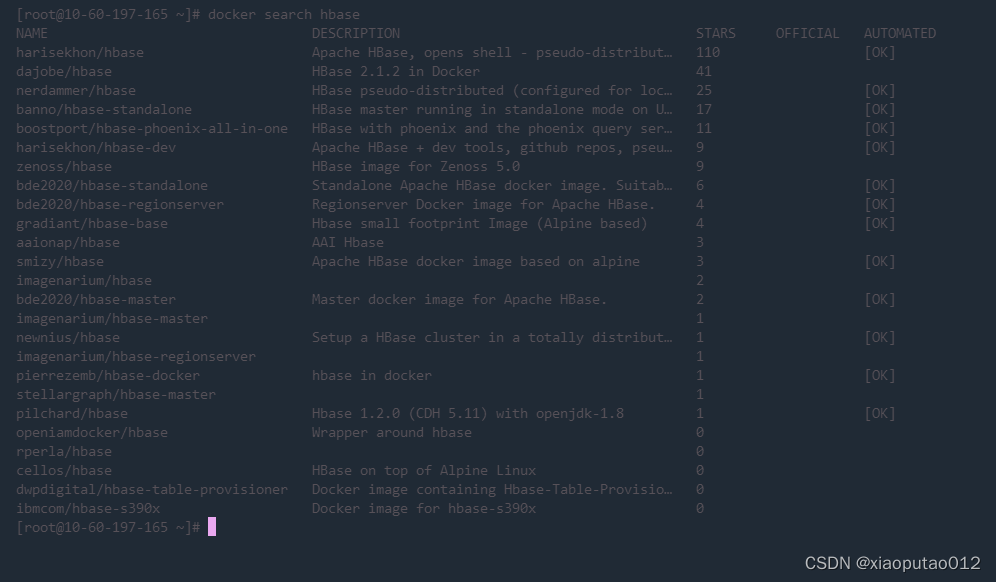
2. 拉取镜像 docker pull harisekhon/hbase
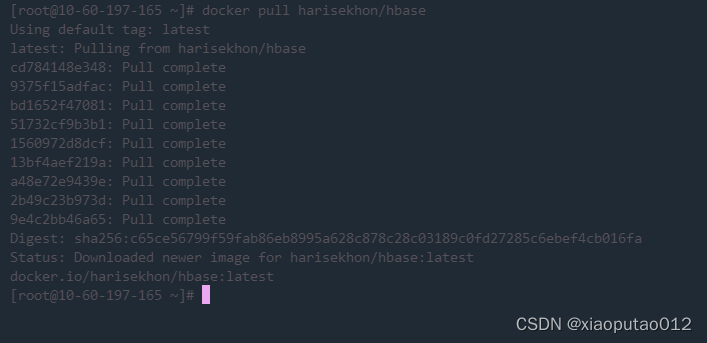
** 看到这个 就代表安装好了 这个是拉取最新版本的 **
然后在进行启动 docker run -d -h hbase -p 2181:2181 -p 8080:8080 -p 8085:8085 -p 9090:9090 -p 9095:9095 -p 16000:16000 -p 16010:16010 -p 16020:16020 -p 16201:16201 -p 16301:16301 --name hbase harisekhon/hbase
注意 如果是服务器 别忘记把这些端口打开

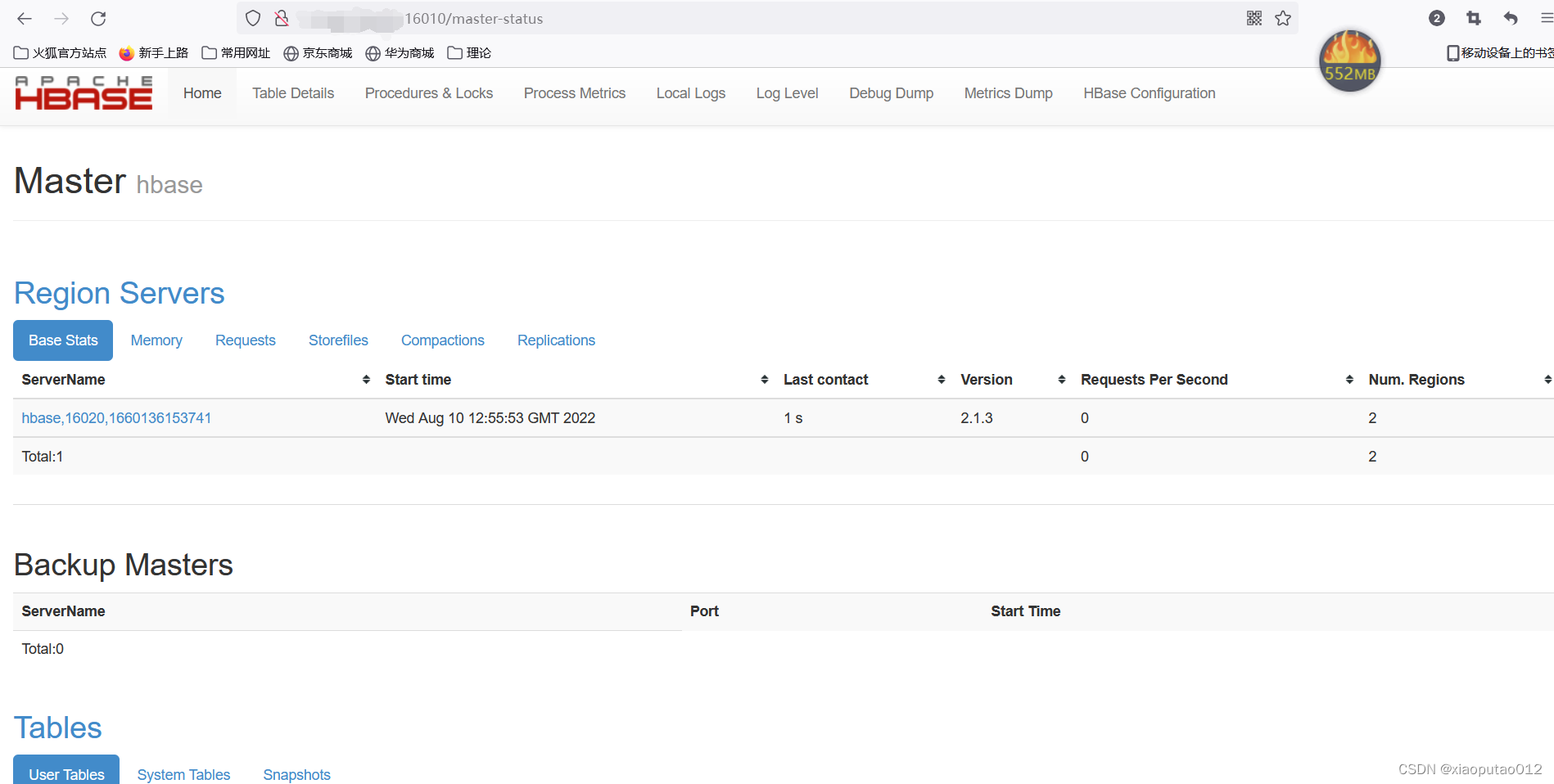
这个是它的一个web页面 下边在进行容器创建表结构 数据加入
命令:docker exec -it hbase bash

cd /hbase/bin

./hbase shell

看到这个 就代表进入成功
建表 create 'sen', 'info'

加入数据 put ''sen','10010','info:name','zhangsan'

查看表结构 scan 'sen'

给指定的id put 'sen','10010','info:sex','MAN'

查看表体数据结构 describe 'sen'
获取指定id数据 get'sen' ,'10010'

清空表 truncate 'sen'

查看表的行数(rowkey的数量)count 'sen'

删除一列数据/一列族数据 delete 'sen', '10010','info:name' deleteall 'sen','10010'


现在进行Java代码连接 用Java代码进行创建表 和添加数据 获取数据
1.首先 获取在docker运行中的hbase容器的容器id docker ps -a

- 在进行域名映射配置 vi /etc/hosts 前边是自己的ip 后边跟着的是 容器id

- 在把容器名称复制 在windows上的windows/system32/drivers/etc/hosts文件 加入这个 ip 容器名称
在用到Java代码写的时候 编译的时候 需要本地安装一个Hadoop 需要一个环境变量
链接: https://pan.baidu.com/s/1Kinj3SZXCVKkb66CzJOqGg?pwd=yv5i 提取码: yv5i
hadoop 压缩包地址
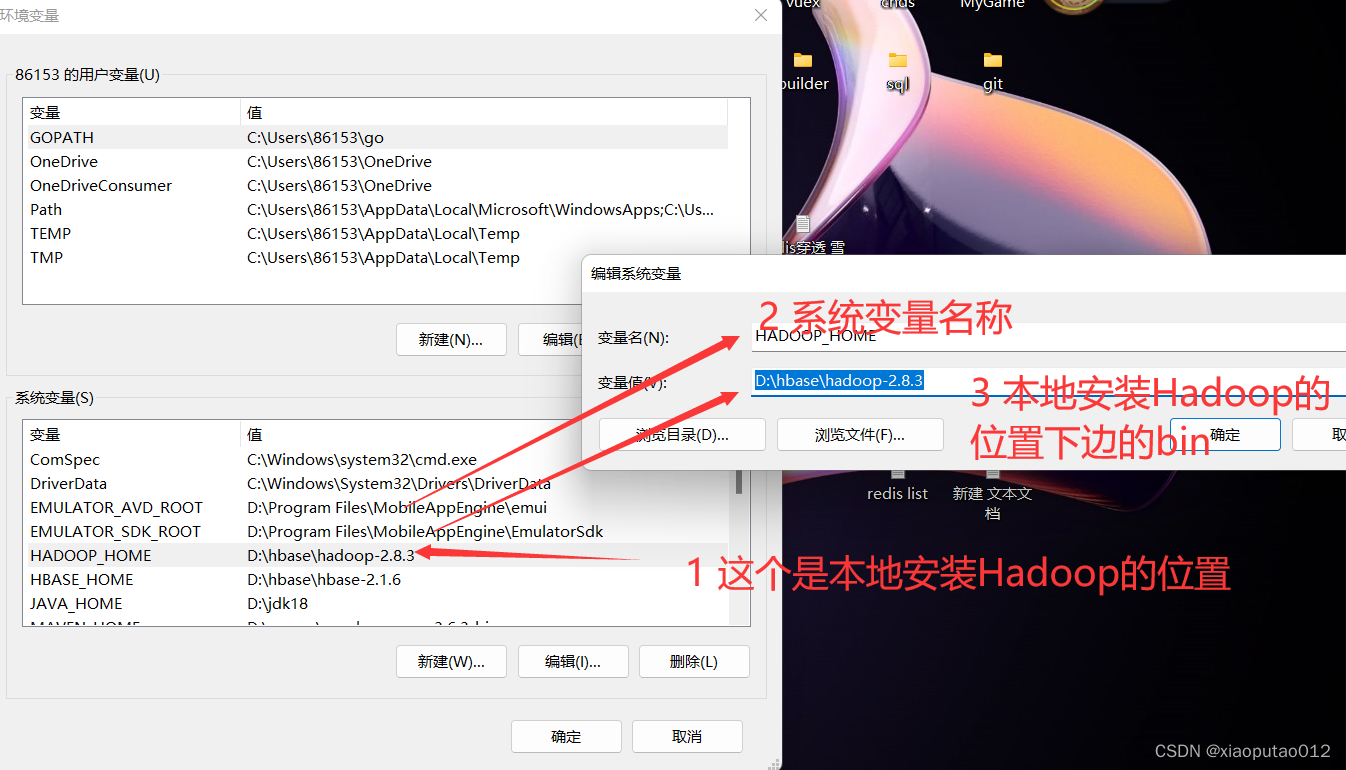
还需要配置一个path
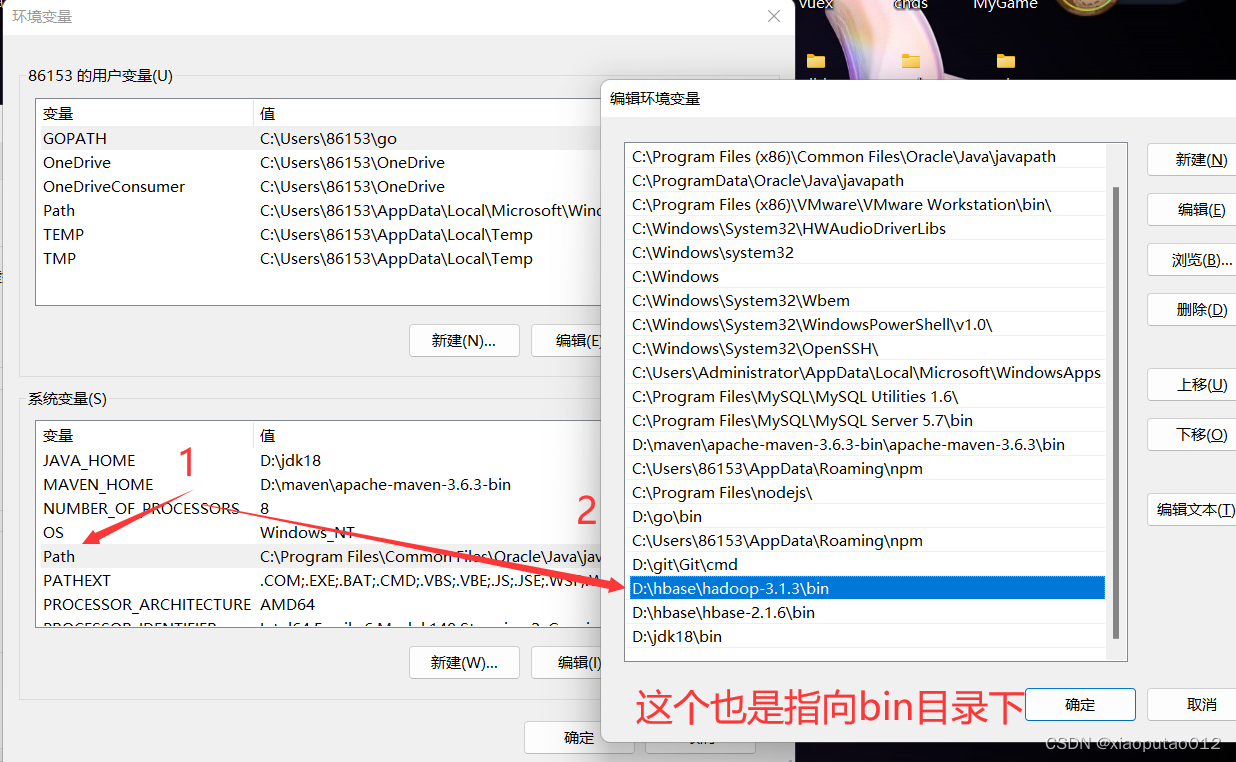
以上操作完毕之后 在写入Java代码 进行连接
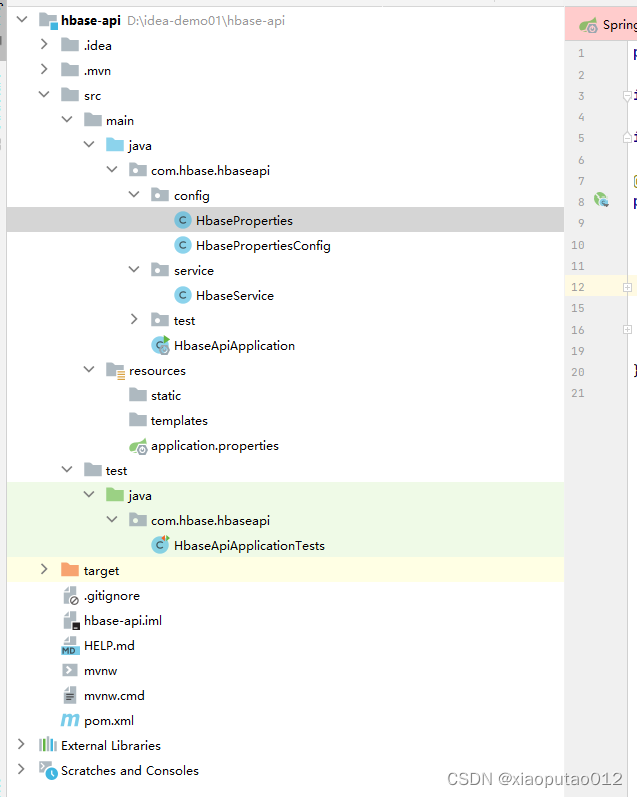
项目结构大致是这样的
配置文件 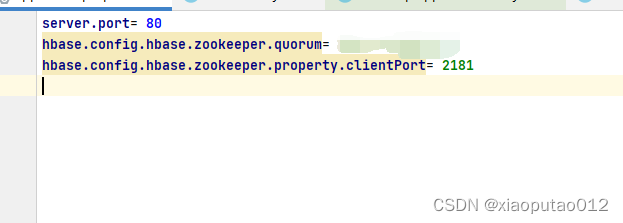
pom依赖
<!-- hbase-client依赖 -->
<dependency>
<groupId>org.apache.hbase</groupId>
<artifactId>hbase-client</artifactId>
<version>2.4.3</version>
</dependency>
HbaseProperties
package com.hbase.hbaseapi.config;
import org.springframework.boot.context.properties.ConfigurationProperties;
import java.util.Map;
@ConfigurationProperties(prefix = "hbase")
public class HbaseProperties {
private Map<String,String> config;
public void setConfig(Map<String, String> config) {
this.config = config;
}
public Map<String, String> getConfig() {
return config;
}
}
HbasePropertiesConfig
package com.hbase.hbaseapi.config;
import java.io.IOException;
import java.util.Map;
import org.apache.hadoop.hbase.HBaseConfiguration;
import org.apache.hadoop.hbase.client.Connection;
import org.apache.hadoop.hbase.client.ConnectionFactory;
import org.apache.hadoop.hbase.client.HBaseAdmin;
import org.springframework.boot.context.properties.EnableConfigurationProperties;
import org.springframework.context.annotation.Bean;
import org.springframework.context.annotation.Configuration;
@Configuration
@EnableConfigurationProperties(HbaseProperties.class)
public class HbasePropertiesConfig {
private final HbaseProperties props;
public HbasePropertiesConfig(HbaseProperties props) {
this.props = props;
}
@Bean
public org.apache.hadoop.conf.Configuration configuration(){
org.apache.hadoop.conf.Configuration conf = HBaseConfiguration.create();
Map<String, String> config = props.getConfig();
config.forEach(conf::set);
return conf;
}
@Bean
public Connection getConnection() throws IOException{
return ConnectionFactory.createConnection(configuration());
}
@Bean
public HBaseAdmin hBaseAdmin() throws IOException {
return (HBaseAdmin) getConnection().getAdmin();
}
}
HbaseService
package com.hbase.hbaseapi.service;
import java.io.IOException;
import java.util.Map;
import org.apache.hadoop.hbase.Cell;
import org.apache.hadoop.hbase.TableName;
import org.apache.hadoop.hbase.client.ColumnFamilyDescriptor;
import org.apache.hadoop.hbase.client.ColumnFamilyDescriptorBuilder;
import org.apache.hadoop.hbase.client.Connection;
import org.apache.hadoop.hbase.client.HBaseAdmin;
import org.apache.hadoop.hbase.client.Put;
import org.apache.hadoop.hbase.client.Result;
import org.apache.hadoop.hbase.client.ResultScanner;
import org.apache.hadoop.hbase.client.Scan;
import org.apache.hadoop.hbase.client.Table;
import org.apache.hadoop.hbase.client.TableDescriptor;
import org.apache.hadoop.hbase.client.TableDescriptorBuilder;
import org.apache.hadoop.hbase.util.Bytes;
import org.springframework.beans.factory.annotation.Autowired;
import org.springframework.stereotype.Service;
@Service
public class HbaseService {
@Autowired
private HBaseAdmin admin;
@Autowired
private Connection connection;
public void createTable(String name,String colFamily) throws IOException {
TableName table = TableName.valueOf(name);
if(admin.tableExists(table)) {
System.out.println("table ["+name+"] exist.");
}
ColumnFamilyDescriptor cfd = ColumnFamilyDescriptorBuilder.newBuilder(Bytes.toBytes(colFamily))
.setMaxVersions(1).build();
TableDescriptor tableDes = TableDescriptorBuilder.newBuilder(table).setColumnFamily(cfd).build();
admin.createTable(tableDes);
}
public void putData(String name,String colFamily,String rowKey,Map<String, String> data) throws IOException {
TableName table = TableName.valueOf(name);
if(admin.tableExists(table)) {
Table t = connection.getTable(table);
Put put = new Put(Bytes.toBytes(rowKey));
for(Map.Entry<String, String> entry:data.entrySet()) {
put.addColumn(Bytes.toBytes(colFamily), Bytes.toBytes(entry.getKey()), Bytes.toBytes(entry.getValue()));
}
t.put(put);
}else {
System.out.println("table ["+name+"] does not exist.");
}
}
public void getData(String name) throws IOException{
TableName table = TableName.valueOf(name);
Table t = connection.getTable(table);
ResultScanner rs = t.getScanner(new Scan());
for(Result r:rs) {
System.out.println("row:"+new String(r.getRow()));
for(Cell cell:r.rawCells()) {
System.out.println("colFamily:"+Bytes.toString(cell.getFamilyArray(),cell.getFamilyOffset(),cell.getFamilyLength())+""
+",qualifier:"+Bytes.toString(cell.getQualifierArray(),cell.getQualifierOffset(),cell.getQualifierLength())+
",value:"+Bytes.toString(cell.getValueArray(),cell.getValueOffset(),cell.getValueLength()));
}
}
}
}
test类
package com.hbase.hbaseapi;
import com.hbase.hbaseapi.service.HbaseService;
import org.apache.hbase.thirdparty.org.apache.commons.collections4.map.HashedMap;
import org.junit.jupiter.api.Test;
import org.junit.runner.RunWith;
import org.springframework.beans.factory.annotation.Autowired;
import org.springframework.boot.test.context.SpringBootTest;
import org.springframework.test.context.junit4.SpringJUnit4ClassRunner;
import java.util.Map;
@SpringBootTest(classes = HbaseApiApplication.class)
@RunWith(SpringJUnit4ClassRunner.class)
class HbaseApiApplicationTests {
@Autowired
private HbaseService hbaseService;
@Test
void contextLoads() {
try {
// 创建表
hbaseService.createTable("scr", "info");
} catch (Exception e) {
e.printStackTrace();
}
}
@Test
public void putData() {
// 添加数据
String name = "scr";
String colFamily = "info";
String rowKey = "2";
Map<String, String> data = new HashedMap<>();
data.put("name", "bb");
data.put("email", "[email protected]");
try {
hbaseService.putData(name, colFamily, rowKey, data);
} catch (Exception e) {
e.printStackTrace();
}
}
// docker run -d -h hbase -p 2181:2181 -p 8080:8080 -p 8085:8085 -p 9090:9090 -p 9095:9095 -p 16000:16000 -p 16010:16010 -p 16201:16201 -p 16301:16301 --name hbase1.3 harisekhon/hbase:1.3
@Test
public void getData() {
// 获取表结构数据
try {
hbaseService.getData("scr");
} catch (Exception e) {
e.printStackTrace();
}
}
}
以上是我个人亲自实践出的 代码 效果 有意见 想法 觉得不好的地方 可以评论 谢谢!
版权归原作者 xiaoputao012 所有, 如有侵权,请联系我们删除。